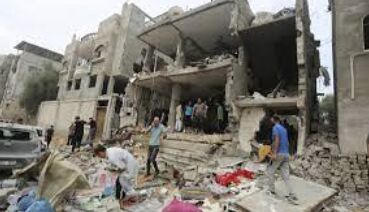Gaza Cut Off from Internet and Telephone Services Amidst Relentless Bombardment: Humanitarian Crisis Deepens
In Gaza, internet and phone services have been cut off, diseases are spreading, and the war with Hamas is expected to last longer. International pressure mounts on Israel for a peaceful resolution.
In a devastating turn of events, internet and telephone services have been cut off in the already war-ravaged Gaza Strip as Israel's bombardment continues to claim the lives of innocent Palestinians. The Palestinian telecommunications company, Paltel, announced the unfortunate loss of all telecom services in the region due to the ongoing offensive. This blackout further worsens the dire situation in Gaza, leaving its residents isolated and disconnected from the outside world. Amidst Israel's relentless barrage on Gaza, another alarming crisis has emerged in the form of a surge in deadly diseases among the displaced population.
With the healthcare system already overwhelmed by the constant influx of injured individuals, the outbreak of diseases adds another layer of suffering to the already dire humanitarian crisis. This further highlights the urgent need for immediate international support to alleviate the plight of the Palestinian people. Israel's Defense Minister has issued a warning that the war with Hamas is expected to last longer than several months. This announcement came during a meeting with US National Security Adviser, Jake Sullivan, in Tel Aviv.
The prolonged conflict raises concerns about the escalating human cost and destruction in Gaza. Meanwhile, US President Joe Biden expressed his dismay at Israel's indiscriminate bombing, stating that it was eroding international support for the country. These remarks highlight the growing international pressure on Israel to reassess its military actions and find a peaceful resolution to the conflict. The war, now in its third month, was sparked by the unprecedented attacks carried out by the Palestinian group Hamas on October 7th, resulting in the deaths of approximately 1,200 people according to Israeli officials. In response, Israel pledged to destroy Hamas and embarked on a relentless military offensive that has left large parts of Gaza in ruins.
The devastating toll on human life is evident as Gaza's Health Ministry reports that a staggering 18,787 people, mostly women and children, have lost their lives. In the midst of this devastation, stories of individual tragedies continue to emerge. In the southern city of Khan Younis, a grey landscape of rubble bears witness to a recent airstrike. Despite the danger, residents are determined to search for survivors, with one man seen wiping his eyes amidst the destruction. The emotional toll on the survivors is immeasurable, as evident from the account of Hassan Bayyout, a 70-year-old resident, who shared that four people remained trapped under the rubble, a result of an airstrike that was carried out without warning.
Beyond the immediate humanitarian crisis, world leaders are urged to take concrete action toward a long-lasting solution. Palestinian Prime Minister Mohammed Shtayyeh implores the Biden administration to back their words with tangible steps towards a two-state solution. This includes applying pressure on Israel to halt its offensive and engage in meaningful dialogue. UK Prime Minister Rishi Sunak, in response to Israel's ambassador's rejection of a two-state solution, reiterates the UK's longstanding position in support of such a resolution. He expresses deep concern for the suffering of civilians in Gaza and emphasizes the urgency for peace. Simultaneously, reports have emerged of Israeli military's new approach to combat Hamas' tunnel complex by pumping seawater into it.
Unnamed US officials are cited in the Wall Street Journal and ABC News as the sources for this information. The flooding process, which is expected to take weeks, aims to destroy the tunnels that Hamas has utilized for various purposes including smuggling weaponry. Israel's military has not provided any comments on this strategy, leaving its effectiveness and potential implications uncertain. The situation in the region continues to escalate as Israeli artillery shelling intensifies in Lebanese border towns where Hezbollah is active.
War correspondents have reported the alleged use of phosphorus bombs by the Israeli army, further amplifying concerns about the escalating violence and its impact on innocent civilians. The international community must step in urgently to prevent further deterioration and find a swift resolution to the ongoing conflict. The suffering of both the Palestinian and Israeli populations emphasizes the urgency of finding a sustainable solution that ensures peace, security, and justice for all parties involved.




